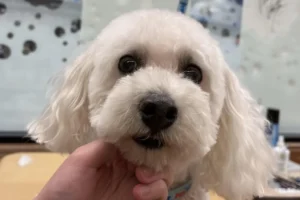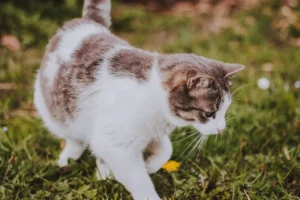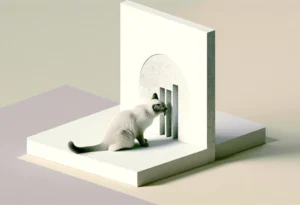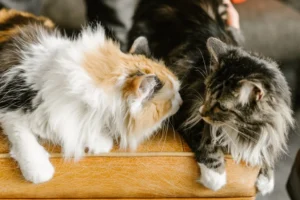Cats are notorious for their constant grooming habits, spending a significant amount of their waking hours cleaning themselves. But why are these creatures so obsessed with grooming? Let’s uncover the reasons behind cats’ meticulous self-cleaning rituals.
Instinctual Behavior:
Grooming is a natural instinct for cats, deeply ingrained in their DNA from their wild ancestors. In the wild, cats groomed themselves to remove scent that could attract predators. This instinct continues in domestic cats, helping them stay clean and maintain a healthy coat. Cats are meticulous groomers, spending hours each day licking their fur, which also helps them cool down in hot weather.
An interesting fact is that cats have rough tongues covered in tiny hook-like structures called papillae. These papillae help cats remove loose fur and debris from their coat, acting as a built-in brush for grooming. So, the next time you see your feline friend engrossed in grooming, remember that it’s not just about staying clean—it’s a deeply ingrained behavior essential for their well-being.
Maintaining Social Bonds:
Grooming isn’t just about hygiene for cats; it also plays a crucial role in maintaining social bonds within feline groups. When cats groom each other, it’s a sign of affection and trust. This behavior helps strengthen bonds between cats, creating a sense of community and belonging.
In multi-cat households, you might observe cats grooming each other as a way to establish hierarchy. The act of one cat grooming another can be a display of dominance or a way to show submission. Through grooming, cats communicate a range of social cues that help them navigate their relationships within the group.
Next time you catch your cats grooming each other, remember that it’s not just about staying clean—it’s their way of strengthening bonds and maintaining social harmony within their feline community.
Temperature Regulation:
Cats may seem like they’re just obsessed with grooming for the sake of looking fabulous, but there’s more to it. Grooming actually helps cats regulate their body temperature. You see, when they lick themselves, it helps to cool them down in hot weather by evaporating saliva from their fur. On the flip side, in cold weather, grooming can help to trap air in their fur, providing insulation and keeping them warm. So next time you catch Mittens licking away, know that she’s just trying to keep cozy or cool.
Sense of Security:
While we humans might turn to a tub of ice cream for comfort, cats have a different way of coping with stress – you guessed it, grooming. Grooming helps cats feel secure and in control, acting as a soothing ritual that helps them relax and de-stress. It’s like their version of a spa day. So, when Fluffy spends hours grooming herself, she’s not just being a neat freak; she’s finding her zen in a busy feline world.
Extra Insight: Another reason cats are so dedicated to self-grooming is that it helps them spread their scent around, marking their territory and asserting dominance. It’s like leaving their calling card wherever they go, a way for them to say, “I’m the boss around here!”
Health and Hygiene:
Cats are obsessed with cleaning themselves because grooming is essential for their health and hygiene. Regular grooming helps prevent parasites like fleas and ticks from infesting their fur. It also helps maintain a clean and healthy coat, reducing the risk of matting and skin infections. Cats have rough tongues covered in tiny hook-like structures that help remove dirt, dead hair, and parasites from their fur. This self-grooming not only keeps them clean but also helps regulate body temperature by distributing natural oils throughout their coat.
Emotional Well-being:
In addition to the physical benefits, grooming plays a crucial role in a cat’s emotional well-being. Grooming reduces boredom and provides a form of self-care, allowing cats to feel more in control of their environment. It also helps relieve stress, as the repetitive motion of grooming can have a calming effect on cats. Moreover, grooming serves as a way for cats to bond with their human or feline companions, reinforcing social connections and providing comfort during times of distress.
Additional Unique Insight:
Cats’ grooming behavior is also linked to their natural hunting instincts. By licking and cleaning themselves, cats mimic the behavior of wild felines who clean themselves to remove scent traces that could alert prey or predators. This grooming ritual is deeply ingrained in a cat’s DNA and serves as a way for them to stay stealthy and agile in the wild.
The Role of Pheromones:
Did you know that when cats groom themselves, they are not just trying to look fabulous? Cats are actually spreading their scent through pheromones, marking their territory, and communicating with other felines. It’s like leaving a little “I was here” message for other cats in the neighborhood. So, next time you catch your furry friend licking themselves clean, remember they’re not just being vain – they’re staking their claim!
Overgrooming and Compulsive Behavior:
While grooming is natural for cats, too much of a good thing can be harmful. Overgrooming can lead to skin issues and even indicate underlying medical conditions that may result in compulsive behavior. Keep an eye on your cat’s grooming habits – if they seem to be licking more than usual or causing damage to their skin, it might be time for a trip to the vet. Remember, a little grooming is good, but moderation is key when it comes to keeping clean and healthy.
Fun Facts About Feline Cleaning:
Did you know that cats spend up to half of their waking hours grooming themselves? That’s right, these furry friends take their cleanliness seriously! This behavior isn’t just about looking good – it also helps regulate their body temperature and maintain healthy skin.
Another interesting tidbit is that a cat’s rough tongue isn’t just for show. It’s covered in tiny, hook-like structures called papillae that help remove dirt and loose fur from their coat. This unique feature not only aids in grooming but also assists in spreading natural oils throughout their fur, keeping it shiny and healthy.
Ever noticed your cat cleaning her face after a meal? This isn’t just about getting rid of food particles – it’s actually a self-soothing behavior. By grooming after eating, cats mimic the action of their mother grooming them as kittens, which can bring a sense of comfort and security.
Why Are Cats Obsessed With Cleaning Themselves?
Have you ever wondered why cats are so fixated on grooming themselves? One key reason is their instinctual need to stay clean. In the wild, a dirty scent could attract predators or signal weakness, so grooming helps cats blend in and stay safe.
Interestingly, grooming also serves as a form of self-care for cats. It helps them relax, relieve stress, and maintain their emotional well-being. Just like how a relaxing bath can rejuvenate us, grooming provides comfort and a sense of control for our feline friends.
Additionally, grooming plays a crucial role in maintaining their fur health. Cats have sensitive skin that requires regular cleaning and grooming to prevent matting, dandruff, or skin infections. By keeping their coat clean and free of tangles, cats ensure they stay healthy and comfortable.
Next time you catch your cat in a grooming session, remember that it’s more than just vanity – it’s a vital part of their daily routine for both physical and emotional well-being.
Alex, a passionate animal lover, has experience in training and understanding animal behavior. As a proud pet parent to two dogs and three cats, he founded AnimalReport.net to share insights from animal experts and expand his knowledge of the animal kingdom.









